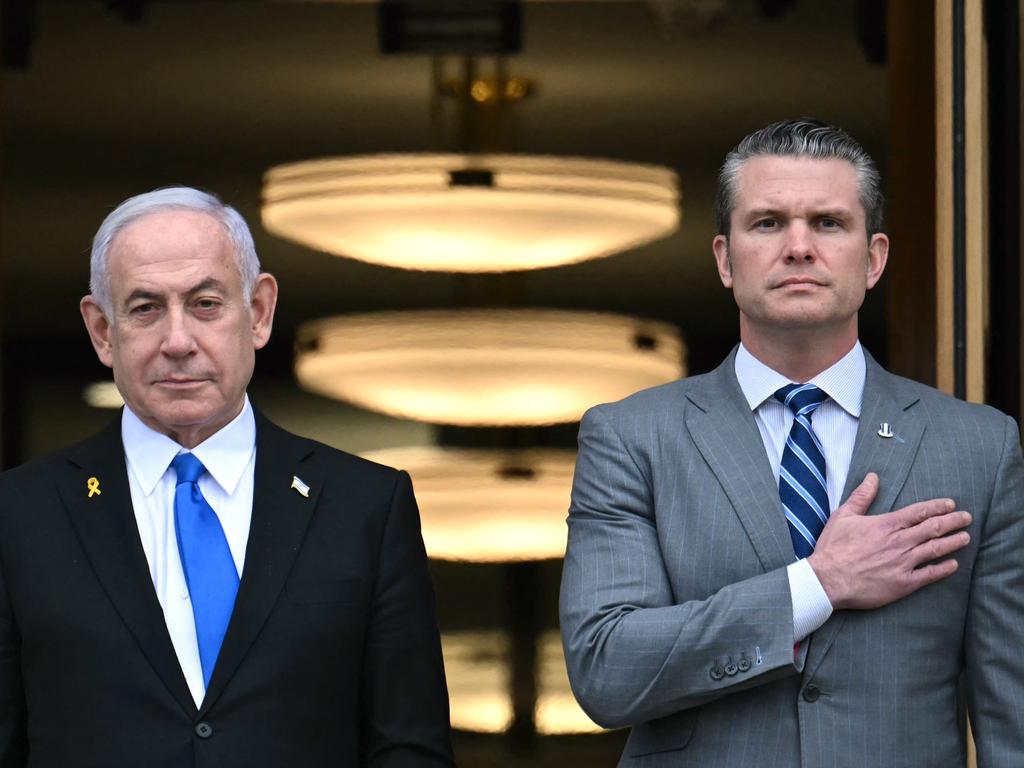Why Donald Trump’s naive plan to ‘own’ Gaza won’t work
Donald Trump has shown the gulf between his position and Anthony Albanese’s, wedging Labor on Palestine. But his plan to ‘own’ Gaza won’t work.
Trump’s Gaza gambit shatters the paralysed orthodoxy of Middle East politics. It is the repeated failure of the status quo that drives and justifies Trump’s upheaval. But disruption doesn’t deliver its own reward and Trump, as US President, fails to offer an alternative agenda either feasible or coherent.
Being a disruptive visionary isn’t enough. Visionaries succeed or fail according to the workability of their proposals. Since Trump’s mid-week announcement, the White House and Secretary of State Marco Rubio have been backtracking, revising and clarifying – trying to sort out something remotely feasible. This is not a smart way to run the presidency.
Trump’s vision is worthless without the support of regional nations and tolerance of the Palestinian people.
Saudi Arabia, Egypt and Jordan are the key nations and all reject Trump’s proposals. But Trump is undeterred. He judges they will be driven into a reassessment by his initiative leading to political progress. And he might be right.
Trump’s fusion of identities has been on display – the compulsive disrupter, the narcissistic strongman, the obsessive deal-maker.
His press secretary, Karoline Leavitt, quickly confirmed what Trump was about – smashing the status quo to shock leaders into more flexible mindsets to negotiate. Leavitt boasted that Trump thinks “outside the box”. She said he was speaking with Arab leaders, that he would be negotiating with them and he was operating from a position of strength.
There are powerful positives in Trump’s agenda – he is determined to end Iran’s use of proxies to destabilise the region.
His executive orders apply “maximum pressure” on Iran, attack its oil exports and mirror Trump’s principle that he “will not tolerate Iran possessing a nuclear weapons capability” – a tough line that will appeal to Arab nations.
But Trump’s declaration really has two meanings – as a strategy, where it is flawed, and as an ideological message to the world. His ideological message is that the radical pro-Palestinian campaign increasingly focused on displacing the Israeli state with its “from the river to the sea” chants, its push for recognition of a Palestinian state devoid of any viable political authority and coupled with rising anti-Semitism across Western democracies and progressive culture will be thwarted and resisted with American power and the quest to get Arab nations to re-think their self-interest.
This sentiment will have appeal and an impact on Western politics including in Australia. It will be polarising. The reason Anthony Albanese is being careful – sensibly – is that Trump’s stance turns the differences on the Middle East policy between Labor and Trump into a chasm. This is happening on election eve.
At the precise time Labor is trying to recover its lost ground – talking up the danger of anti-Semitism and moving into a “law and order” mode – it will be caught by having an American President promoting a peace plan it cannot support while striving in the national interest to cement cordial relations with that same American President.
The Greens have launched their denunciation of Trump’s plan, sure to run through the campaign. Liberal leader Peter Dutton hasn’t endorsed Trump’s announcement – that would be folly – but talks up its positives and sends the message that the Coalition is supportive of what Trump wants to achieve.
Albanese can’t stay silent forever. He doesn’t need to respond to everything Trump said; in fact, he shouldn’t. But the gulf with Trump will be obvious and the Trump-Albanese divide on policy towards Israel – over Gaza, a Palestinian state and funding of UNRWA – will be further highlighted.
The risk for Australia is that social, racial and religious tensions will be accentuated.
Trump’s Middle East disruption reveals an unpredictable but almost familiar trait – American presidential hubris. Yes, it’s still alive, it didn’t die with the neo-cons, with Bill Clinton or George W. Bush. Trump isn’t their sort of globalist, but he is fused with the deepest instinct of the presidency – the belief in America’s global manifest destiny as “the indispensable nation” shaping the world order, a doctrine Trump had supposedly consigned to the dustbin of history.
Trump believes in tariffs, transactional politics, cutting deals and avoiding foreign wars – but the compulsive faith in American power still beats in his heart and led him, this week, into a Middle East plan, epic in scope, fantastic in its delusions but rooted, ultimately, in the almost mystical faith that America can still shape the world and, with Trump’s own negotiating genius, turn the impossible into the achievable.
The two untenable claims in Trump’s scheme are that the US will “own” Gaza – a situation the American people would reject – and that the 1.8 million Palestinian population would be removed from Gaza into neighbouring Arab states to allow the rebuilding – implying the Palestinians would walk away from their territorial and sovereign existence and claims. Trump refused to canvass the idea of a two-state solution.
His proposals are brazen and naive. The recent lessons of Iraq and Afghanistan – as Trump knows – show that America cannot successfully impose its vision on other nations, the Middle East being the prime instance.
At face value, his Middle East vision seems anathema to the ideology Trump has championed for years – making America great again by getting out of foreign wars, military operations, costly entanglements and nation-building adventurism.
The Wall Street Journal said there was “discord” among Republicans, that Trump’s long-time philosophical champion, Steve Bannon, was opposed while veteran Republican senator Lindsey Graham, said: “I’ve been on the phone with Arabs all day. That approach, I think, will be very problematic.” The WSJ said senior defence officials who may be involved in Trump’s agenda reported: “Nobody knows what’s happening.” The bulk of Australia’s Jewish community, while supporting Trump’s stance to rebuild Gaza, rejects any forceable removal of Palestinians with Colin Rubenstein, executive director of the Australian/Israel & Jewish Affairs Council, saying in this paper any such removal would be “legally and morally unthinkable”.
Despite the failures of Iraq and Afghanistan, Trump said in his announcement the US “will take over the Gaza Strip and we will do a job with it, too”. He said the US would “own it” and “level the site, and get rid of the destroyed buildings”, thereby “creating an economic development that will supply unlimited numbers of jobs and housing”. He was specific. “I do see a long-term ownership position … Everybody I’ve spoken to loves the idea of the United States owning that piece of land.
“I don’t want to be a wise guy,” Trump said. “But the Riviera of the Middle East, this could be something that could be so, this could be so magnificent.” He said people living in Gaza should “go to other countries of interest” and “we should go to other countries of interest with humanitarian hearts, and there are many of them that want to do this, and build various domains that will be occupied by the 1.8 million Palestinians living in Gaza, ending the death and destruction”. They could go to “numerous sites or it could be one large site” since Gaza was now a demolition site.
Trump said if people went back to Gaza “it’s going to end up the same way it has for a hundred years” – the aim instead was for “the Arab and Muslim nations to have peace and tranquility”. Asked who he envisaged living in Gaza, Trump said “the world’s people”. He said: “I think you’ll make that into an international, unbelievable place” and added, when asked, “Palestinians also”. Trump said: “Palestinians will live there, many people will live there. But they’ve tried the other and they’ve tried it for decades and decades and decades. It’s not going to work. It didn’t work. It will never work. And you have to learn from history.”
He spoke from passion and conviction – and with a real estate agent’s eye.
Trump is right in saying “it’s time to do something different” – but that’s a sentiment, not a policy. Within a short time the revisions and clarifications were being made. Should we be surprised? Press Secretary Leavitt said Trump had no commitment to putting in US troops. She said the American taxpayers would not be asked to pay for the rebuilding of Gaza. That’s fine – but who does pay to create the Riviera in the Middle East? Critically, Leavitt, along with Rubio, said the exodus of the Palestinians would be only for a temporary period.
Such clarifications and revisions were predictable. That’s how Trump functions, the tariff saga this week proved the point. One reason that Albanese said nothing on the opening day and didn’t take the media’s bait was because he assumed, correctly, that Trump’s position would be further clarified within hours.

Trump said Saudi Arabia “is going to be very helpful” and its leaders wanted peace. He said “he felt King Abdullah of Jordan and President El-Sisi of Egypt “will open their hearts and give us the kind of land that we need” – that is, to take the relocation of Palestinians from Gaza.
But they are among the Arab leaders who have immediately rejected Trump’s scheme. Arab countries loathe the political and terrorist problems the entry of any radical Palestinian movement would bring them.
Saudi Arabia has said support for a Palestinian state was its “unwavering position”. Trump is about to meet Jordan’s King Abdullah but the king rejects any effort to “annex land and displace the Palestinians”. Trump has plunged himself into the most daunting negotiation of his career – but it seems difficult to see how he proceeds without making major concessions. Palestinian leaders have been accusing Trump of promoting war crimes and ethnic cleansing.
The questions remain. How will Trump persuade the Palestinians to leave Gaza? What happens to those who refuse to leave? Will Trump pursue this goal or negotiate instead for the Arab states to commit financially to Gaza’s rebuilding? Does Trump envisage Israel being deeply involved in his plans for Gaza?
On the other hand, Trump has raised questions for the Arab states and for the Palestinians. How do they guarantee Hamas has no political role in Gaza’s future? Do some Palestinians prefer to leave during the years of rebuilding from the current hellhole? What are viable security and political arrangements for Gaza’s future? How tenable is the Arab stance of full support for a Palestinian state but denying any more Palestinians on to their own territory?
The ideological message Trump sends is targeted at both Arab states and progressives in Western democracies. The UN backing for a two-state solution is hollow without fundamental changes in Middle East politics. Much of the progressive demand for a two-state solution is bankrupt unless there is progress in denying Hamas its authority and seeking a new security and political reconstruction of Gaza.

The omens cannot be missed. Trump has publicly warned Hamas that the hostages must be returned. What might he do, if they are not? Israeli PM Benjamin Netanyahu has pivoted from Gaza to the West Bank. Given Trump’s move on Gaza, would he support an Israel move to annex the West Bank? The Trump-Netanyahu symbolism surely points to further joint action.
“You are the greatest friend Israel has ever had in the White House,” Netanyahu said to Trump. He said Trump’s initiative was taking Israel’s goals “to a much higher level” and praised Trump for his “willingness to puncture conventional thinking”.
So, what comes next?
Trump’s initiative is likely to accentuate divisions in Australia’s community. Palestinian outrage is guaranteed; it will blow back on Labor. Already some Palestinians say they would rather die than leave Gaza. But Palestinian protest will not work in Australia during an election campaign. The risk is that it will alienate majority sentiment and pose an electoral danger for Labor.
The differences between Trump and Penny Wong’s Middle East policy could hardly be greater. Labor is hostage to Wong’s policy shift and its Muslim voting base. The task for Albanese and Wong will be to focus on Australia’s policy principles and avoid direct criticism of Trump’s policy – but that won’t be easy, since his policy is so manifestly flawed.
Meanwhile, Dutton is positioning carefully, calling Trump “a big thinker and a deal maker” and backing Trump’s effort to “leverage” neighbouring states into working towards a new settlement. Albanese was prudent initially to sidestep early commentary on Trump’s announcement. Most world leaders said nothing. Media criticism of Albanese’s discretion was nonsense. He did the right thing – but he cannot escape the need for a more considered response.
A final thought – Trump’s Middle East vision confirms his 19th century, old-fashioned imperialism embodied in his elevation of president William McKinley. It was McKinley who acquired stacks of new territory for the US resulting from the 1898 war with Spain. And Trump wants to acquire Greenland, make Canada the 51st state, control the Panama Canal, and now, improbably, take control of Gaza. Territorial ambition seems integral to his quest.








Donald Trump, the great disrupter, has launched the ultimate disruption – proposing the re-making of the Middle East and Gaza in a set of ideas that at face value are imprecise, unworkable, chaotic and present more dangers than they do opportunity.